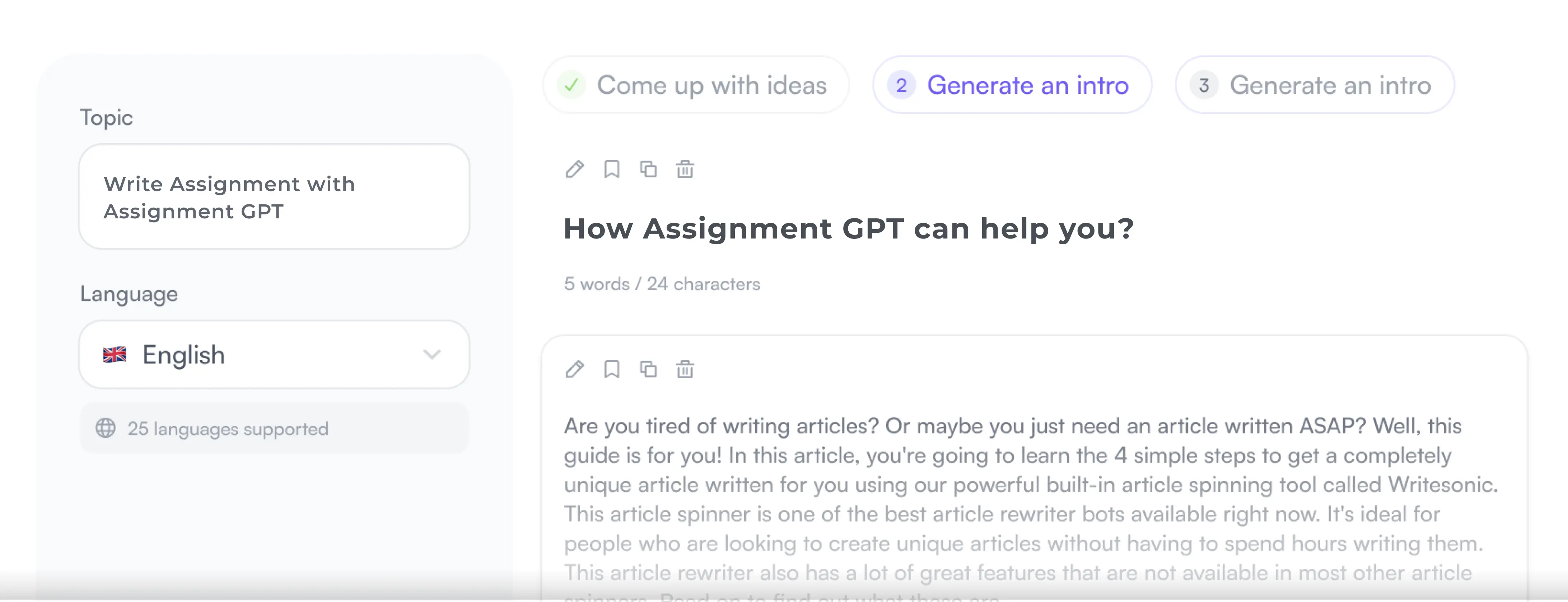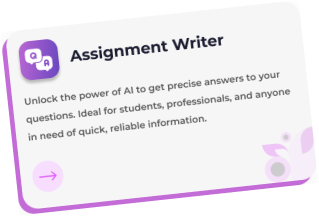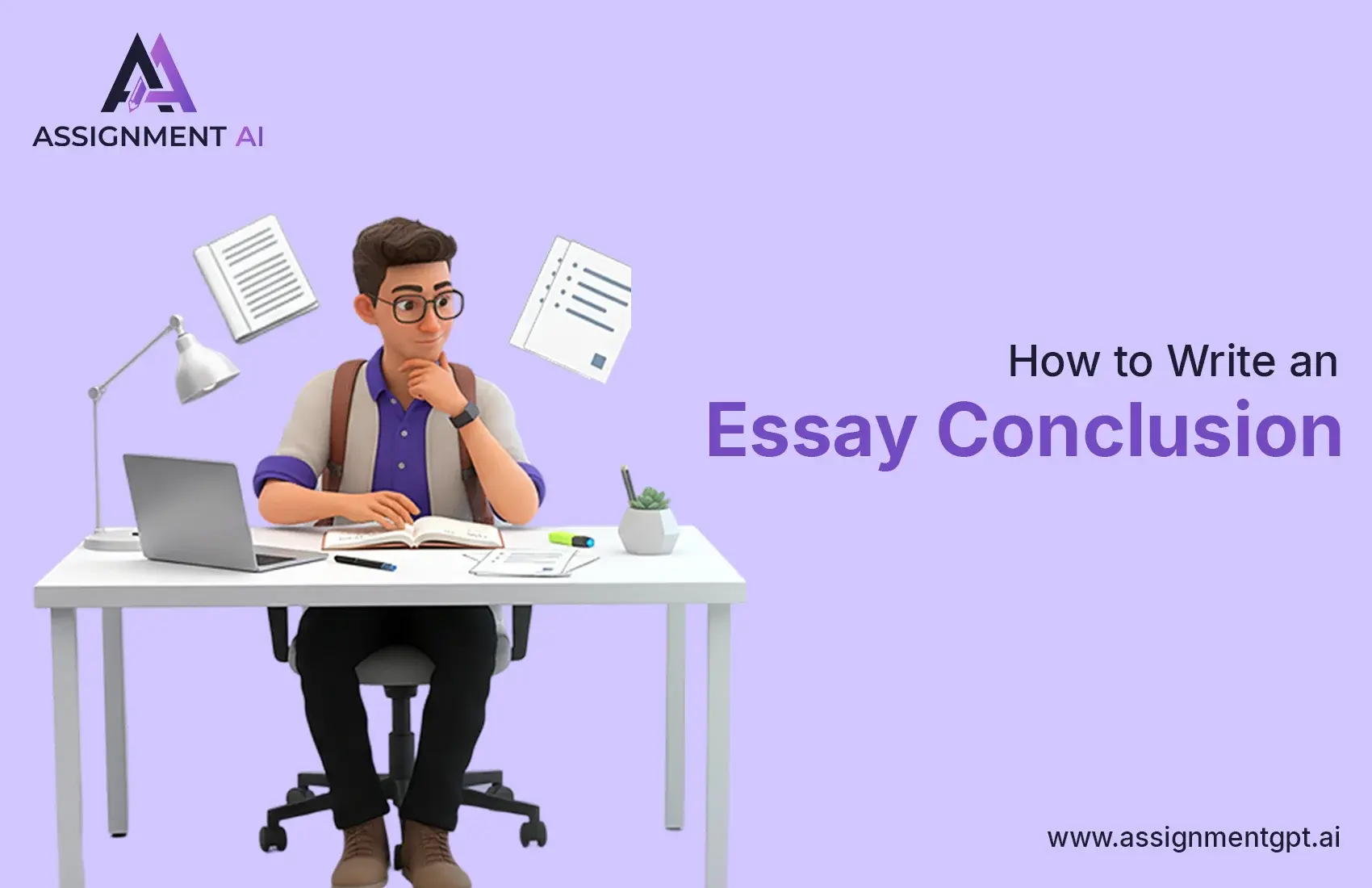AssignmentGPT Blogs
Have you ever gotten to the end of an essay and thought to yourself, "How do I end this so perfectly?” You’re not the only one. Writing a conclusion to an essay often seems challenging, not because you don’t have plenty to say, but simply because you're not quite sure how to say it well.
Consider your essay conclusion as your final impression with a reader firm, memorable, and confident. It’s your final opportunity to leave a lasting impact and to remind a reader why your argument mattered in the first place.
In this article, I will guide you from my personal experience and will discuss all essential information you need to know to write a memorable conclusion for your essay, from comprehension of a conclusion’s purposes to expert-level techniques and strategies that will make your closing both impactful and meaningful.
Quick Summary
I have seen many students who do not focus much on the conclusion; they feel that the conclusion is just a part of the ending, and hence, instead of writing the conclusion, they copy lines from the essay itself, which is a wrong practice. The conclusion of the essay depends on the topic and essay length.
The conclusion brings together all the important meanings of the essay, like ideas, final morals, and information. So that when the reader reads it, it proves to be a better meaningful essay for him.
My teacher once explained to me that the conclusion should always be such that if the reader reads only your conclusion, they should understand the depth and motive of the content by reading only the conclusion.
A strong conclusion does not contain allusions to any new evidence, does not over-summarise, does not shift tone, and does not use clichés like "in conclusion." The good practice for academic writing or for exams like IELTS and PTE is to keep conclusions short, cohesive, and functional.
Our focus in this article:
- Why is the conclusion of an essay so important?
- What does a good essay conclusion look like?
- What are effective strategies for writing a better essay conclusion?
- What common mistakes should you avoid when writing a conclusion?
- In this article, we will explain a better conclusion through examples.

Why Are Conclusions Important in an Essay?
The conclusion is arguably one of the primary components of any Essay because it provides a sense of closure for the reader. While the introduction introduced the conversation, and the body developed the ideas, the conclusion ties everything up and leaves the reader reflective.
A great conclusion will truly show the reader:
- The discussion has come to a defined end.
- The central ideas are meaningful and impactful.
- You are ready to share a strong opinion or message.
The function of any conclusion is not to merely restate your thesis and key important points, but rather to summarize the key points in a new way. This reinforces the main argument or thesis of the essay, without repeating the introduction. In paraphrasing, you are demonstrating your comprehension of an argument while expressing the same meaning in different ways, an essential component of writing.
In addition, a strong conclusion adds to the coherence of the writing, meaning the ideas have a narrative logic and progression to them from the beginning to the end. Even with strong body paragraphs, a poorly constructed conclusion can make the essay feel incomplete or without logical structure. However, a strong conclusion gives the essay balance as well as evidence that your thoughts are independent and organised.
Write Perfect Assignments With AI Assignment Writer
Professional assignment writing powered by AI. Get well-researched, plagiarism-free content for any subject instantly.
Try Assignment Writer Free
What a Good Conclusion Should Do
Let us understand in detail what a good conclusion looks like and how it impacts the reader.
1. Summarize the Main Ideas
The word summarize refers to compiling information to create a full picture of something. In your conclusion, that is exactly what you will do: compile all of the ideas you put forth into one cohesive message.
For example, if your paper was about technology enhancing education, you would summarize how your examples all supported your point. Avoid listing your evidence, but show how they link to support your argument.
Example:
“Online learning platforms and AI tutors are two examples of technology, masking education to reach a new level of interaction. In summary, these technologies ensure education is not bound by time or distance.”
This is how to show they are demonstrating multiple understandings. A level of understanding and sophistication, things examiners want.
2. Restate your Thesis in a New Way
I think repetition kills, but rephrasing gives it a new life. When rephrasing, do not cut and paste from the introduction. Write your thesis as a representation of both growth and time. Let the reader see that the process of writing the meeting topic refined your thoughts.
Example:
Thesis from intro: “Social media has a negative impact on teens’ self-esteem.” Reworded thesis: “Through writing the meeting topic, I realised its resulting impact on perception and behaviour because social media presents continued challenges to teens' confidence in ways that are both subtle and significant.” This did not simply reword your thoughts; it took them deeper.
Effective Strategies for Crafting an Impactful Conclusion
Let me tell you some effective strategies from my personal experience, using which you can reach impactful conclusions.
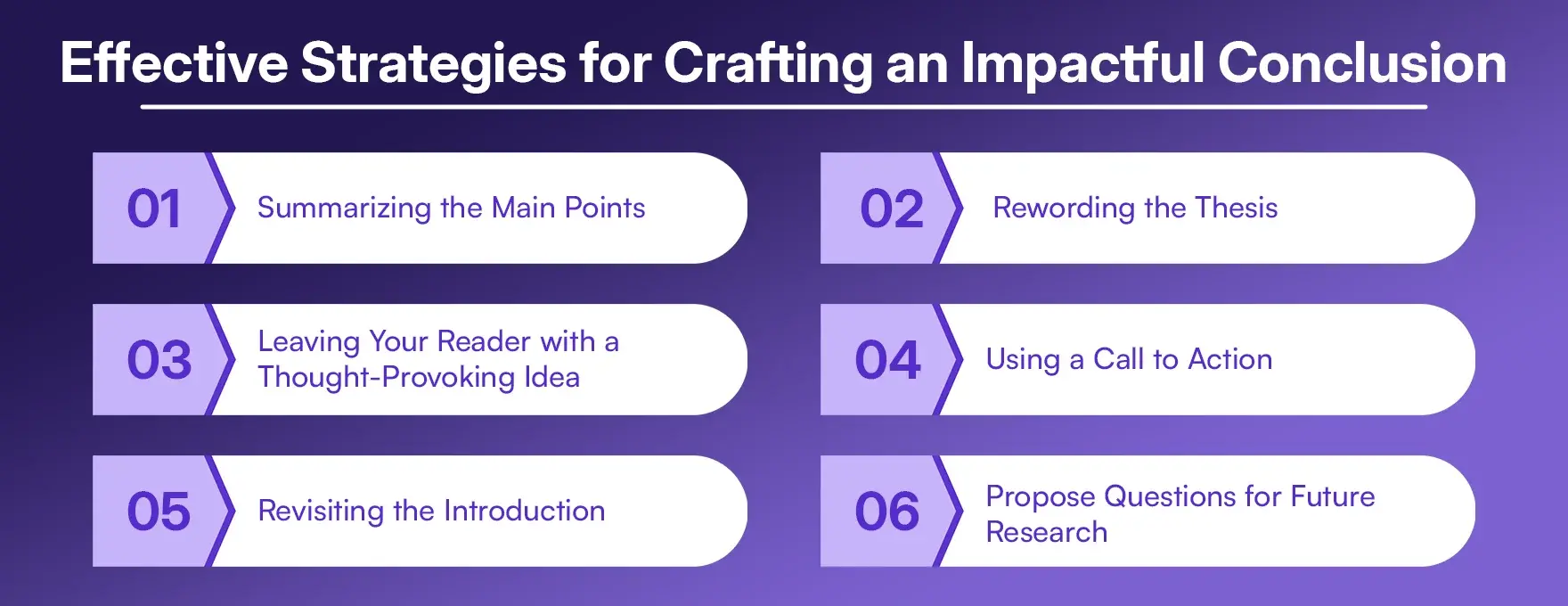
1. Summarizing the Main Points
You will not want to present your conclusion like a list with bullet points. Instead, seamlessly weave together your ideas. This involves highlighting how your main arguments connect with each other and support one another.
For example,
"Technology may be distracting, but the positives of personalizing learning opportunities, connecting classrooms around the world, and cultivating creativity, ultimately outweigh the distractions while simultaneously changing the way we access and share knowledge."
In this case, the synthesis indicates critical thinking, which is a strong character trait of a good essay.
2. Rewording the Thesis
A strong essay conclusion will always reword the thesis, but in a sense of moving forward. In other words, consider it an opportunity to show how your argument progressed through evidence.
For example,
"In the end, climate change is not only a human and environmental issue, but it is a moral and economic duty we all share.”
In this example, the thesis moves from simply being a statement to an assertion. This tone sounds confident and builds trust and authority, both essential components of E-E-A-T.
3. Leaving Your Reader with a Thought-Provoking Idea
An excellent way to conclude your essay is with a thought-provoking idea, something that makes the reader think. You could leave the reader with a rhetorical question, a quote, or some idea that expands the discussion.
Example:
"If education is indeed the key to progress, how we decide to unlock education in our digital age will shape future generations."
This type of conclusion stays with the reader and is often more introspective.
4. Using a Call to Action
Sometimes a conclusion should motivate the reader to take action. This is especially true for persuasive essays. A call to action gives significance to your argument.
Example:
"The time for us to act against climate change is now - not tomorrow, not next year. What we do as individuals does matter, and it can add up to build both local and worldwide momentum." Call-to-action conclusions turn your essay away from information to inspiration.
5. Revisiting the Introduction
This is one of the most powerful techniques professional writers utilize. If you utilized a story, statistic, or question to begin the essay, return to that story, statistic, or question in the conclusion. This technique allows for a complete arc as well as closure of the essay in an emotionally satisfying manner.
Example:
"While the student in our opening example may have had barriers to educational opportunities, today’s learners continue to experience the same barriers today, but through online learning, they have the opportunity to overcome."
This type of conclusion not only wraps up your essay but also suggests finality and complete writing.
6. Propose Questions for Future Research
In an academic or research context, an open-ended question about potential future changes indicates future thinking.
Example:
"While the data supports that creative thinking can increase with current digital tools, what is yet to be explored is how future technology may completely change how, when and where creativity occurs during the learning processes."
This type of the conclusion adds value to the essay and appeals to examiners who appreciate the intention to think further and for potential research agendas.

Ready to Get Started? Join thousands of students using AssignmentGPT for better grades. Sign up free and unlock all features! Sign Up Free
What to Avoid: Common Mistakes in Conclusions
Even experienced writers can trip up when writing conclusions, so I'll share some of the most common traps to avoid:
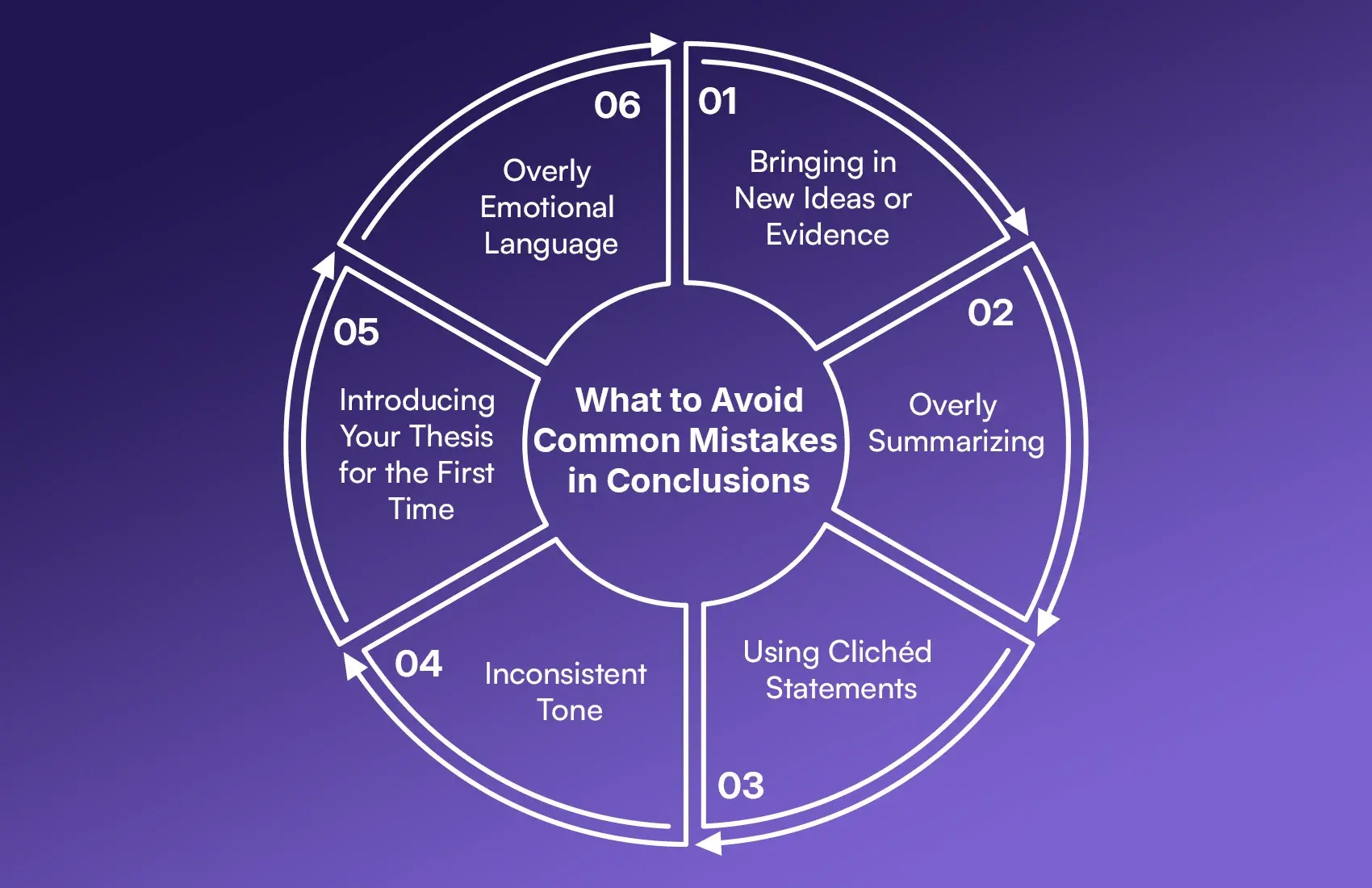
Bringing in New Ideas or Evidence: Never introduce a new argument in the conclusion; it only confuses the reader and dilutes your overall argument.
Overly Summarizing: Reiterating every point in the body is usually unnecessary when writing the conclusion; instead, synthesize, and show the "big picture."
Using Clichéd Statements: Statements like "In conclusion," "To sum up," or "as I've shown" are insincere and mechanical. Instead, opt for a more natural transition (for example, "Ultimately," or "To look back").
Inconsistent Tone: Always keep your tone consistent throughout your essay; if you are writing a more formal essay, you should not finish it with a casual statement or emotional moment.
Introducing Your Thesis for the First Time: Your thesis statement should always be introduced in the introduction of the essay, not the conclusion.
Overly Emotional Language: You can still express some passion in your writing, but anything too dramatic can weaken your credibility, so try to keep a balance.
Examples & Techniques
Let us try to understand good conclusions through some best examples and techniques.
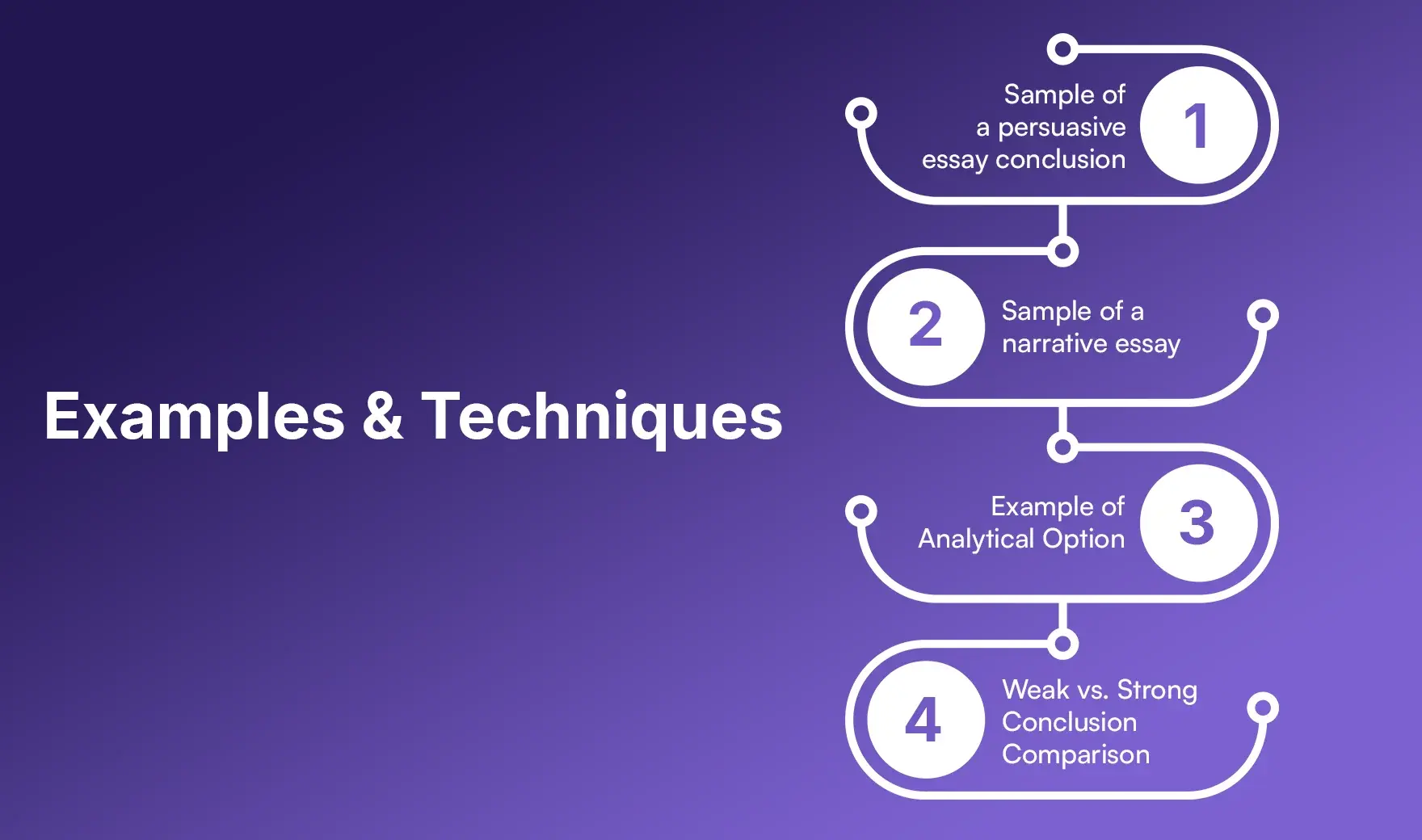
1. Sample of a persuasive essay conclusion
"The data demonstrates one unequivocal truth: renewable energy is not a luxury, but the cornerstone of our future. With every policy, every investment, and every entrepreneur’s leap of faith, we are getting closer to a sustainable world. The question is, will we continue to take the next leap?"
Why it works: It is powerful, it is inspiring and most importantly, it leads to a natural conclusion and pushes the reader onward.
2. Sample of a narrative essay
“As I sat on the porch and watched the sun slowly drop behind the horizon, I realised that endings are not endings at all, but beginnings."
Why it works: It is emotional, it is reflective, and it fits the tone of a narrative, storytelling essay.
3. Example of Analytical Option
“Looking at the characters in Shakespeare, we see how ambition and morality are often related; power seduces those who desire it the most.”
Why it works: It provides insight rather than repeating the text. It interprets rather than summarises.
4. Weak vs. Strong Conclusion Comparison
| Weak Conclusion | Strong Conclusion |
|---|---|
| “In conclusion, technology is important. We should use it wisely.” | “Technology is more than a tool, it’s a reflection of how we choose to grow, connect, and shape the world ahead.” |
Lesson: The second example is inspiring and forms a connection with the reader in an emotional way, but the first one simply ends (off).
Special Offer: Get 70% Off on Lifetime Plan
Upgrade now and save big on unlimited assignments, advanced features, and priority support. Limited time only!
Claim Offer NowTips for conclusions in PTE, IELTS, and other exams
Conclusions are important in exams, including the IELTS, PTE, TOEFL, and other academic writing assessments, because they are explicitly assessed under Coherence & Cohesion. Even if your introduction and body paragraphs are written solidly, a poor conclusion can leave your writing feeling incomplete or random.
Think of your conclusion as the final wrap-up conversation with your examiner, the last time you can confidently wrap up your story and reinforce your message. You have already given your ideas, now you want to wrap it all up cleanly and leave your examiner feeling, “Well-structured!”
Let's know some practical tips to get you started writing high-scoring conclusions in your English-language exam essay.
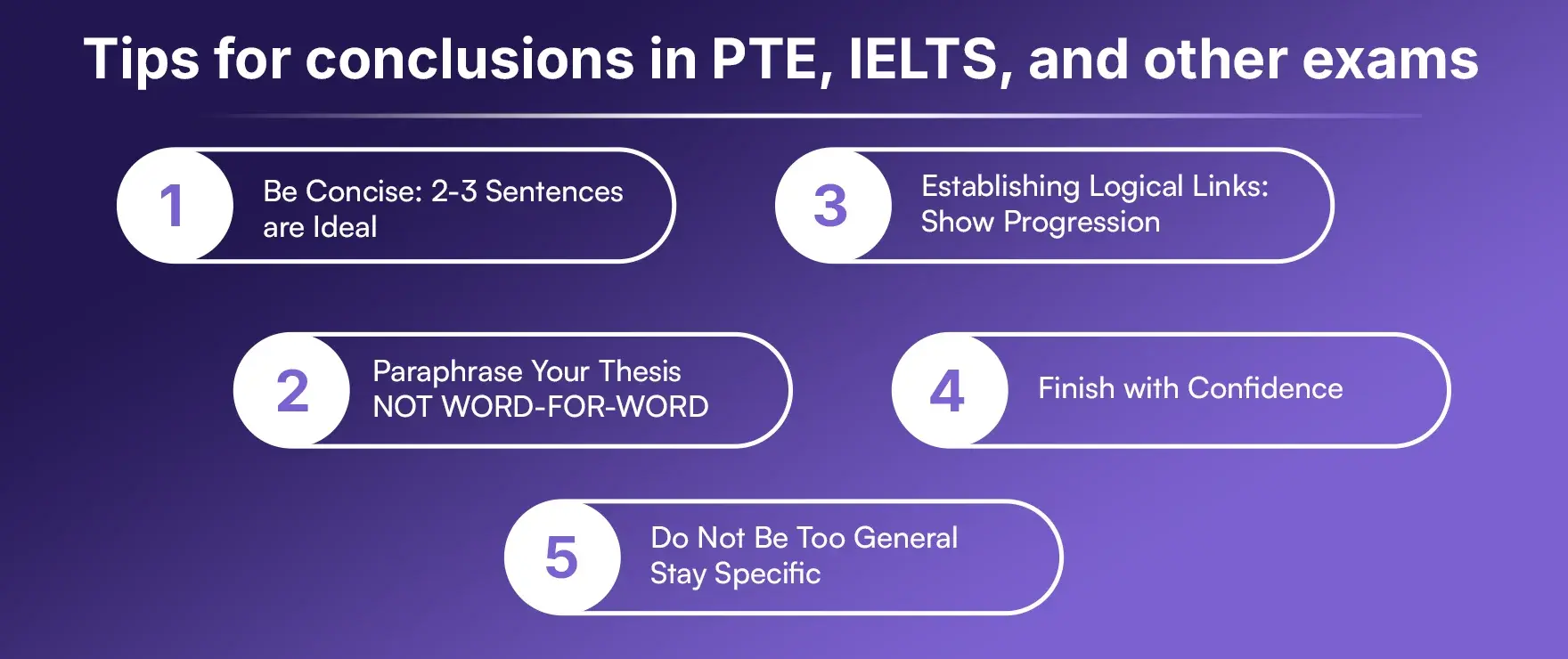
1. Be Concise: 2-3 Sentences are Ideal
While there are situations in academic research essays where long conclusions may be warranted, exam essays do not have this luxury. Time is always short. There is a word limit. And examiners do not want unnecessary repetition.
Exam essays typically require a conclusion of just 2-3 carefully formulated sentences that will:
- Restate your thesis
- Summarise your main point
- Leave a final thought
- Too long = repetitious and unfocused
- Too short = incomplete or abrupt
Examiners care because A concise conclusion indicates you can effectively communicate ideas without wasting words, an important requirement of academic writing tests.
Example Template:
- Sentence 1: Rephrase Thesis
- Sentence 2: Summarise Key Reasoning
- Sentence 3: Final Thought or Implication
This provides structure, clarity, and professionalism.
2. Paraphrase Your Thesis - NOT WORD-FOR-WORD
Your conclusion should revisit the central argument or opinion of your essay, but copying your thesis sentence directly from the introduction displays limited vocabulary and a weak variety of language.
- Instead, paraphrase the idea with:
- synonyms
- different sentence structures
- larger or more nuanced meanings
This shows the examiner that:
- You understood the topic
- You maintained a clear opinion
- You demonstrated lexical flexibility
Example: Intro Thesis:
"Governments should spend more on public transport because it will reduce pollution and traffic."
Rephrased Conclusion Thesis:
"More funding towards public transport is important, because this is a practical means of managing congestion, while also protecting the environment."
Same message - different language - higher score.
3. Establishing Logical Links: Show Progression
Once again, your conclusion should remind the reader that it is the conclusion of the essay, and not a separate paragraph. You can best do this by implying throughout the essay that your ideas are logically progressing.
Essentially, you're not just repeating your points; you're also demonstrating how they connect and wrap up your points. Examiners will be looking for:
- Clear progression
- Cohesive argument
- Unity: To establish this link
You will want to summarize your main arguments in a single sentence, without repeating the examples referencing the evidence.
Example:
"In conclusion, improved affordability, less congestion and environmental benefits clearly illustrate why public transport deserves a better investment in urban transport."
This sentence shows a logical connection between,
The arguments in the previous sentences restated the main thesis, summarizing the remarks logically. This logical unity contributes to your Coherence & Cohesion score.
4. Finish with Confidence
Your final sentence should read with confidence, as if you firmly believe in what you have argued.
It communicates:
- Strong opinion
- Correct tone
- Closure
Do not use weaker, unfocused endings: "Perhaps this will help..." "I think this is probably good..."
Instead, use stronger language. Good phrases for transition:
- Thus
- In conclusion
- In the end
- Fairly
- All in all
Example of a confident ending:
"In the end, encouraging public transportation use is one of the best ways to help cities become more efficient and clean."
The key with a strong ending is to show maturity and that you have prepared for the exam.
5. Do Not Be Too General - Stay Specific
A conclusion should not suddenly zoom out to some general global statement that has very little to do with your essay.
Too broad:
"Technology is beneficial for society and always will."
Less broad: "The former statement, therefore, suggests that technology in the classroom can change student learning by providing personalized, accessible, and engaging experiences no matter where the student is in the world."
The second statement stays in closer proximity to the subject at hand, which is what examiners will give credit for.
Do not write:
- General/social statements
- Moral statements
- Philosophical statements that have nothing to do with your subject and topic
More specificity = more clarity = better score.
Ways to Refine Your Conclusion
Let us now know in detail how you can refine your essay conclusions so that your conclusions do not become too lengthy or boring.
Implement a Revision Checklist
- Is your thesis restated obviously in your conclusion?
- Does it refer back to the introduction?
- Is the tone consistent?
- Is it complete and satisfying?
Vary the Formatting of Sentences
Always vary your short, powerful lines and your longer, contemplative lines to create rhythm. If your conclusion is lengthy, try to break your conclusion by using different formats, which will help readers to understand your conclusion more easily.
Stay True to Purpose
All conclusions should think and do the same thing as your essay, like Inform, persuade or tell a story. Always try to write an essay honestly or more meaningfully.
The “So What” Test
After reading the conclusion, ask yourself: “So what?” If the reader can answer why your essay mattered, you have done it right.
Conclusion
Writing a conclusion to an essay doesn't necessarily mean you're finishing it, but rather giving it a final ending that leaves the reader satisfied. Always ensure your conclusion provides a short, relevant answer to the meaning you've learnt from an in-depth essay. A good conclusion includes all of these points.
- Reinforces without repeating.
- Inspires without overwhelming.
- Feels natural, not forced.
- Includes all important points.
Having written many academic essays and assignments in my career, I can say that the conclusion of an essay should be simple and meaningful. You can use copywriting platforms like AssignmentGPT AI for this.
Next time you write, do not forget that your conclusion is worthy of as much consideration as your introduction. Use these strategies to practice, and before long, you will compose conclusions that act not merely as a summary, but speak to your readers long after they finish reading.
FAQs
1. How long should the conclusion of my essay be?
2. May I include quotations in my conclusion?
3. May I include new information?
4. How can I make my conclusion engaging?
5. Is “In conclusion” necessary?
6. How do examiners assess conclusions?
7. Do I need to restate all of my body paragraphs?
8. What’s the biggest mistake with writing conclusions?
9. How do I add an ability for creativity to my conclusion?
10. How do I conclude a persuasive essay?
11. May I include personal opinions in the conclusion?
12. How do I incorporate personal opinion in the conclusion?
Content writer at @AssignmentGPT
Ashu Singh, content writer at AssignmentGPT, crafting clear, engaging content that simplifies complex tech topics, with a focus on AI tools and digital platforms for empowered user experiences.
Master AI with
AssignmentGPT!
Get exclusive access to insider AI stories, tips and tricks. Sign up to the newsletter and be in the know!

Transform Your Studies with the Power of AssignmentGPT
Empower your academic pursuits with tools to enhance your learning speed and optimize your productivity, enabling you to excel in your studies with greater ease.
Start Your Free Trial ➤Start your success story with Assignment GPT! 🌟 Let's soar! 🚀
Step into the future of writing with our AI-powered platform. Start your free trial today and revolutionize your productivity, saving over 20 hours weekly.
Try For FREE ➤